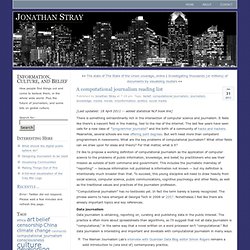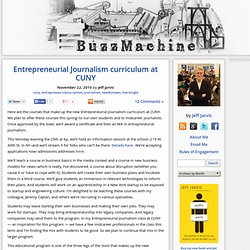

Claystone rethinking radicalisation. Brand-journalism_EN. Maps, the Power of the Crowd & Big Data Verification. Kazakh journalist beaten, left for dead. The International Press Institute (IPI) has called on authorities in Kazakhstan to investigate an attack on a journalist in the country’s capital city of Astana, which left the victim hospitalised with severe injuries.

Ularkbek Baitailaq, who works for the Kazakh National Archive and has written articles for the opposition ‘Dat’ weekly, ‘Chetvyortaya vlast’ newspaper and ‘Altyn Tamyr’ magazine, was attacked outside his home on Wednesday, according to a report from Radio Free Europe/Radio Liberty’s (RFL/RL) Kazakh Service. Adil Sol, a media rights organisation based in Kazakhstan, reported that the attackers left Baitalaq for dead following the attack. RFE/RL explained that the police authorities could not be reached for comment. MATTER by Matter. Share this project Done Share Tweet Embed by Matter The world is full of big stories.

San Francisco, CAWeb pledged of $50,000 goal. The News Article Is Breaking Up. About EJC - Blog. Interested in data-driven journalism? The EJC in collaboration with Mirko Lorenz at Deutshe Welle have created a survey that aims to gather the opinion of journalists on the emerging practice of data-driven journalism and understand their training needs in this field. Data has always been used as a source for reporting especially by investigative journalists and will play an increasingly important role in journalism in the future.
Data-driven investigative operations in the past however involved a lot of resources and time. Learning lessons from social media’s new-found prominence. A computational journalism reading list. [Last updated: 18 April 2011 -- added statistical NLP book link] There is something extraordinarily rich in the intersection of computer science and journalism.

It feels like there’s a nascent field in the making, tied to the rise of the internet. The last few years have seen calls for a new class of “programmer journalist” and the birth of a community of hacks and hackers. Meanwhile, several schools are now offering joint degrees. But we’ll need more than competent programmers in newsrooms. I’d like to propose a working definition of computational journalism as the application of computer science to the problems of public information, knowledge, and belief, by practitioners who see their mission as outside of both commerce and government. How Journalists Are Using Social Media To Report on the Egyptian Demonstrations.
With the Internet still inaccessible for the majority of people in Egypt, much of the international community is relying on journalists with satellite phones for real-time updates on the violent protests calling for Hosni Mubarak to resign after 30 years in power.

The demonstrations are continuing despite the government's attempts to block communications channels, including the Internet, SMS, TV broadcast by journalists, and mobile networks. Pundits have been weighing in on the role of social media in sparking the uprising, and whether it is a necessary ingredient in accelerating modern revolutions or simply an over-hyped notion. In some respects, the attempt to block communication has done little to stifle reports coming out of the country. Though much of the citizenry isn't able to broadcast themselves, their stories are being told and amplified by reporters. Op zoek naar een toekomstbestendig model voor journalistieke mediaorganisaties : Dode Bomen. Posted on | January 27, 2011 | Comments.

Interviews integraal op internet publiceren – Goed idee! Doen we niet! « De nieuwe reporter. Begin november opperde Femke Halsema om ruwe, ongemonteerde interviews op internet te publiceren.

Goed voor de journalist en goed voor de geïnterviewde, zo meende ze. Maar wat vinden de Nederlandse hoofdredacteuren van dat voorstel? Multimediaal uitgeven in de B2B markt « De nieuwe reporter. “Internetredacties werden gehinderd door kranten-mensen die het web niet kennen en willen kennen” Gisteren meldde De Nieuwe Reporter dat de internetredacties van Het Parool, de Volkskrant en Trouw zullen worden losgesneden van hun krantenredacties en naar Rotterdam verhuizen. OJR: Journalism’s problem isn’t the internet or advertising, it’s attitude. What’s the biggest problem facing the journalism industry?

Why The New York Times eliminated its social media editor position. Earlier this week, New York Times Social Media Editor Jennifer Preston tweeted that she would be returning to reporting full-time.

The news made me wonder: What would this mean for social media at the Times? Preston told me by phone that the Times plans to eliminate her position in early 2011 and shift social media responsibilities to Aron Pilhofer‘s interactive news team. When her current job ends, Preston will begin covering social media as a Times reporter. The move is part of the Times’ efforts to more fully integrate its print and digital operations.
How Investigative Journalism Is Prospering in the Age of Social Media. In a society that is more connected than ever, investigative journalists that were once shrouded in mystery are now taking advantage of their online community relationships to help scour documents and uncover potential wrongs.

Entrepreneurial Journalism curriculum at CUNY « BuzzMachine. Here are the courses that make up the new Entrepreneurial Journalism curriculum at CUNY.

We plan to offer these courses this spring–to our own students and to midcareer journalists. Once approved by the state, we’ll award a certificate and then an MA in entrepreneurial journalism. Journalistiek 2.0: de meningen zijn verdeeld. Onder journalisten lijkt een soort tweedeling te zijn ontstaan. Aan de ene kant staan de Jan Tromps, die de journalist nog altijd als autoriteit zien en zuur kijken als ze over Twitter en bloggen praten.
Aan de andere kant staan de Henk Blankens, die zichzelf als journalist herontdekken en wensen dat de journalistiek de functie van informatiemakelaar krijgt. De 2 kampen uitgelicht. Digital + Diversity: What does your newsroom reflect? If you ask a Web journalist what the newest, important tool a news organization needs to embrace today, they’d probably say Social Media. They’re right, it’s not a fad . If you were to ask them to make a prediction or guess where the future of technology is headed, chances are they’d say mobile. Smart phones are getting smarter, smaller and cheaper. Investigative Journalism in the Age of the Social Web by Vadim Lavrusik on Prezi. Hoe co-creatie en inkomstenmodellen essentieel zijn voor lokale berichtgeving. Nederland telt inmiddels een groeiend aantal (hyper)lokale websites en weblogs (iemand enig idee hoeveel?).
In ruime verscheidenheid publiceren zij actuele berichten in tekst, foto en video over de lokale bevolking en lokale evenementen, gebeurtenissen, verenigingen, bedrijfsleven, recreatie en cultuur. Het is bedoeld voor en gemaakt door lokaal betrokken mensen. GUEST POST: Saddleworth News – how hyperlocals are building social capital « LGiU – the local democracy blog. Saddleworth News Richard Jones, editor of Saddleworth News, has done a cracking job chronicaling the daily drama surrounding the Oldham East and Saddleworth byelection. Being a Saddleworth resident, his interviews with the candidates added true local value and perspective to the election and (I believe) ultimately helped voters make more informed decisions on issues relevant to their community.
A university without walls. This post forms part of the Carnival of Journalism, whose theme this month is universities’ roles in their local community. In traditional journalism the concept of community is a broad one, typically used when the speaker really means ‘audience’, or ‘market’. In a networked age, however, a community is an asset: it is a much more significant source of information than in other media; an active producer of content; and, perhaps most importantly, at the heart of any online distribution system.
You can see this at work in some of the most successful content startups of the internet era – Boing Boing, The Huffington Post, Slashdot – and even in mainstream outlets such as The Guardian, with, for example, its productive community around the Data Blog. Teaching community-driven journalism. What can online publishers learn from gaming? The demise of mainstream print media is now taken as gospel by many leading editors and media thinkers, while an even more radical idea — that there may not be any online future for existing newsrooms — is also being put forward. Whether or not you believe in that nightmare scenario is not important right now.
What everyone in the news media does seem to agree about, is that engaging their online audiences is stupendously important. Online publishers are still finding answers to the question: how would people like to interact with the media? One bold answer may come from the online gaming industry. Badgeville, a Palo Alto-based startup, applies game mechanics and design principles to help web publishers foster community engagement.
How News Organizations Are Generating Revenue From Social Media. Though social media has proved itself an effective tool in helping journalists gather news and connect with their communities, a pervading question among the skeptics still remains: Where's the money? As social sites like Twitter and Facebook build their empires and seek to remedy their own financial instability in the hope of turning profits, news organizations are experimenting with ways to monetize their social media presence and leverage the social web to complete an online revenue puzzle. The revenue is there, but the social web won't necessarily solve that puzzle.
“There's no silver bullet,” Jim Brady, the general manager at TBD.com, said at the Online News Association Conference last week. “There's just shrapnel, pieces of revenue.” Brady, who launched TBD.com this summer, said display ads are certainly not the future in revenue for news and that it will come from multiple revenue streams.
Self-Serve "Real Time Ads" It is especially useful for local business. The world as you've never seen it before. Omarm dat klagende publiek!